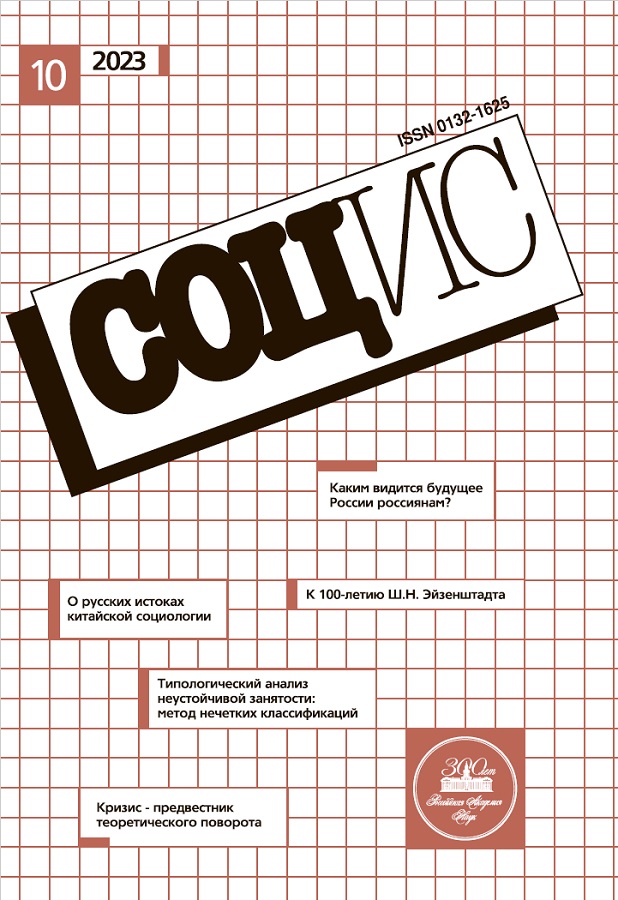Women’s Activity in the Public Sphere: Dynamics of Ethnogender Attitudes in the South of Russia
- Авторлар: Klimenko L.V.1, Vereshagina A.V.1
-
Мекемелер:
- Southern Federal University
- Шығарылым: № 10 (2023)
- Беттер: 137-145
- Бөлім: Articles
- URL: https://rjmseer.com/0132-1625/article/view/661993
- DOI: https://doi.org/10.31857/S013216250028311-5
- ID: 661993
Дәйексөз келтіру
Аннотация
Determination of the vector of development and sources of integration of multi-ethnic societies should include an assessment of gender systems. The South of Russia is distinguished by a specific ethno-cultural and socio-economic diversity. Nowadays, it includes the territories of two federal districts - the Southern and the North Caucasian (9 national republics and more than 40 nationalities). Economically developed territories and modern social relations coexist with territories with a demodernized economy, low living standards and a traditionalist type of social relations. Official statistics and various studies show the segregation of women in the work sphere and socio-political activity. The article discusses the results of sociological research conducted in six sub-regions of the South of Russia in three stages (2004, 2010 and 2020 years). On the grounds for the content of attitudes regarding the public forms of activity of women, the degree of coincidence of the views of men and women, as well as the vector of the dynamics of ethno -agricultural installations, the subregions of the South of Russia are differentiated into three types - traditional, transition and modernized. The traditional type (Ingushetia, Dagestan) is characterized by high indicators of conservatism of gender attitudes of men and women who are quite stable. The transition type (Kabardino-Balkaria, Adygea, Karachay-Cherkessia) has higher indicators of the approval of the public activity of women with a pronounced gap between the estimates of men and women, when the latter are more often focused on the deconstruction of the traditional gender display. The modernized type (Rostov region) is associated with a more sustainable level of egalitarization of plants in both gender subgroups. The inconsistency of ethno -agricultural attitudes in the field of public activity of women complicates the macro -level integration and reduces the efficiency of the use of human capital of the polyeterical south of Russia.
Негізгі сөздер
Авторлар туралы
Liudmila Klimenko
Southern Federal UniversityRussian Federation, Rostov-on-Don
Anna Vereshagina
Southern Federal UniversityRussian Federation, Rostov-on-Don
Әдебиет тізімі
- Авксентьев В.А., Гриценко Г.Д., Дмитриев А.В. Региональная конфликтология: концепты и российская практика. М.: Альфа-М, 2008.
- Атлас модернизации России и ее регионов: социоэкономические и социокультурные тенденции и проблемы / Сост. и отв. ред. Н.И. Лапин. М.: Весь мир, 2016.
- Аузан А.А., Антонов Е.В., Брызгалин В.А. и др. Социокультурные факторы инновационной̆ активности населения. М.: ИНП, 2019.
- Верещагина А.В., Загирова Э.М. Многоженство в Дагестане в оптике общественного мнения // Социологические исследования. 2022. № 2. С. 117–128. doi: 10.31857/S013216250016856-4.
- Денисова Г.С., Дмитриев А.В., Клименко Л.В. Южно-российская идентичность: факторы и ресурсы. М.: Альфа-М, 2010.
- Денисова Г.С., Уланов В.П. Русские на Северном Кавказе: анализ трансформации социокультурного статуса. Ростов-н/Д.: РГПУ, 2003.
- Женщины и мужчины России. 2020: Стат. сб. М.: Росстат, 2022. URL: https://rosstat.gov.ru/folder/210/document/13215
- Клименко Л.В. Гендерные отношения на Юге России: этносоциологический анализ. Ростов-н/Д.: ФНО, 2021б.
- Клименко Л.В. Семья в поликультурном пространстве Юга России: этногендерное измерение// Женщина в российском обществе. 2021а. № 3. С. 99–116. doi: 10.21064/WinRS.2021.3.8.
- Культура имеет значение: каким образом ценности способствуют общественному прогрессу / Под ред. Л. Харрисон, С. Хантингтон. М.: МШПИ. 2002.
- Матишов Г.Г., Авксентьев В.А., Батиев Л.В. Атлас социально-политических проблем, угроз и рисков Юга России. Ростов н/Д.: ЮНЦ РАН, 2008.
- Межэтнические отношения и религиозная ситуация в Южном федеральном округе. Экспертный доклад (итоги 2019 г.) / Под общ. ред. Г.С. Денисовой. Ростов-н/Д.: ФНО, 2020.
- Почебут Л.Г., Шмелева И.А. Гендерные отношения в разных этнических культурах России // Психологический журнал. 2015. Т. 36. № 6. С. 66–75.
- Сиражудинова С.В. Гендер и фронтир на Северном Кавказе // Вестник антропологии. 2022. № 2. С. 128–140. doi: 10.33876/2311-0546/2022-2/128-140.
- Сиражудинова С.В. Гендерная система мусульманского общества: на примере республик Северного Кавказа // Женщина в российском обществе. 2021. № 1. С. 56–67. doi: 10.21064/WinRS.2021.1.5
- Сиражудинова С.В. Гендерные границы и перспективы гендерного диалога на Северном Кавказе // Женщина в российском обществе. 2015. № 1(74). С. 53-61. doi: 10.24412/2500- 221X-2015-174-53-61.
- Стародубровская И.В. Кризис традиционной северокавказской семьи в постсоветский период и его социальные последствия // Журнал исследований социальной политики. 2019. Т.17. №1. С. 39–56. DOI: https://doi.org/10.17323/727-0634-2019-17-1-39-56.
- Текуева М.А. Мир чувственных переживаний кавказской женщины // Вестник антропологии. 2019. № 3 (47). С. 22–38. doi: 10.33876/2311-0546/2019-47-3/22-38.
- Темкина А., Роткирх А. Советские гендерные контракты и их трансформация в современной России// Социологические исследования. 2002. №1. С. 4-15.
- Хаджалова Х.М., Абдулаева З.З. Гендерные особенности рынка труда в республиках Северного Кавказа // Экономика труда. 2019. № 4. С. 1463–1474. doi: 10.18334/et.6.4.41228.
- Чеснов Я.В. Лекции по исторической этнологии: Уч. пос. М.: Гардарики, 1998.
- Шоранова З.В., Виндижева А.О., Желеготова Р.М., Решетникова Н.Н. Деконструкция традиционного гендерного порядка в северокавказском обществе в начале XXI века // Гуманитарий Юга России. 2021. Т. 10. № 2. С. 138–149. doi: 10.18522/2227-8656.2021.2.12.
- Inglehart R., Baker W. Modernization, Cultural Change, and the persistence of Traditional Values // American Sociological Review. 2000. No. 2 (65). Р. 19–51. doi: 10.2307/2657288.
Қосымша файлдар









